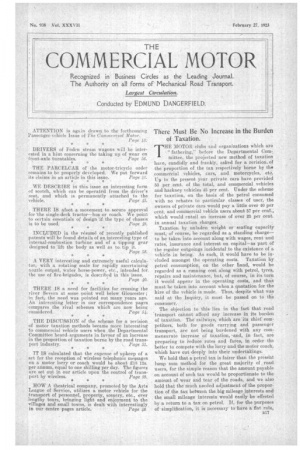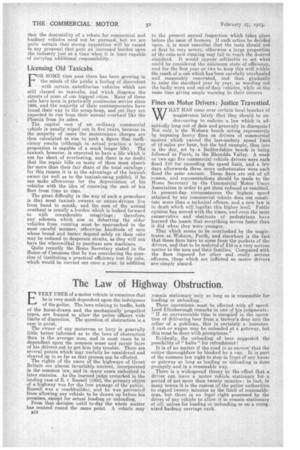There Must Be No Increase in the Burden of Taxation.
Page 1

Page 2

If you've noticed an error in this article please click here to report it so we can fix it.
HE MOTOR clubs and organizations which are ," fathering," before the Departmental Com-, mittee, the projected new method of taxation have, candidly and frankly, asked for a revision, of the proportion of the tax respectively borne by the ,commercial vehicles, cars, and motorcycles, etc.. Up to the present year private cars have provided 53 per cent. of the total, and commercial vehicles and hackney vehicles 45 per cent. Under the scheme for taxation, on the basis of the petrol consumed with no rebates to particular classes of user, the owners of private cars would pay a little over 40 per cent. and commercial vehicle users a,boub 57 per cent., which would entail an increase of over 25 per cent. in annual taxation charges.
Taxation by unladen weight or seating capacity must, of course, be regarded as a standing charge— to be taken into account along with wages, rent and rates, insurance and interest on capital—as part of the regular outgoings incidental to the existence of a vehiclein being. As such, it would have to be included amongst the operating costs. Taxation by petrol consumption, on the other hand, would be regarded as a running cost along with petrol, tyres, repairs and maintenance, but, of course, in its turn it. would appear in the operating costs, and thus must be taken into account when a quotation for the hire of the vehicle is made. Thus, despite what was said at the Inquiry, it must be passed on to the consumer., • .
The objection to this lies in the fact that road transport cannot afford any increase in its burden of taxation. The railways, which'are' its chief competitors, both for goods carrying and passenger transport, are not being burdened with any commensurate increase of taxation, -and,. in fact, are preparing to 'reduce rates and •fares, in .order the better to compete with the lorry and the motor coach, which have cut deeply into their undertakings.
We hold that a petrol tax is fairer than the present lump sum method for the great majority of road users, for the simple reason that the amount payable on account of such tax would be proportionate to the amount Of wear, and tear of the roads, and we also hold that the much needed adjustment of the proportion of the tax between the big mileage interests and the small mileage interests would easily be effected by a return to a tax on petrol. If, for the purposes of simplification, it is necessary to' have a flat rate, then the desirability of a rebate for commercial and hackney vehicles need not be ' pursued, but we are quite certain that strong opposition will be raised to any proposal that puts an increased burden upon the industry just at a time when it is least. capable of carrying additional responsibility.
Licensing Old Taxicabs.
FOR SOME time past there has been growing in the minds of the public a feeling of disecntent with certain antediluvian vehicles which are still classed as taxicabs, and which disgrace the streets of some of our biggest cities. Many of these cabs have been in practically continuous service since 1908, and the majority of their contemporaries have found their way to the scrap-heap, and yet they are expected to rise from their annual overhaul like the Phcenix from its ashes.
The capital cost of an ordinary commercial vehicle is usually wiped out in five years, because in the majority of cases the maintenance charges are then calculated to rise to such a figure that inefficiency results (although in actual practice a large proportion is capable of a much longer life). The taxicab, however, is expected to have a life which is not far short of everlasting, and there is no doubt that the repair bills on many of them must absorb far more than their fair share of the total earnings ; for this reason it is to the advantage of the taxicab owner (as well as to the taxicab-using public), if he can make allowances for the depreciation of his vehicles with the idea of renewing the unit of his fleet from time to time.
The great difficulty in the way of such a procedure is that most taxicab owners or owner-drivers live from hand to mouth, and the cost of the annual overhaul is usually a burden which is looked forward
to with considerable misgivings ; therefore, any schemes which aim at debarring the older vehicles from running must be approached in the most careful manner, otherwise hundreds of men whose bread and butter depend solely on their cabs may be reduced to desperate straits, as they will not have the wherewithal to purchase new machines.
Quite recently the Home Secretary stated in the House of Commons that be was considering the question of instituting a practical efficiency test for cabs, which would be carried out once a year, in addition to the present annual inspection which takes place before the issue of licences. If such action be decided upon, it is most essential that the tests should not at first be very severe, otherwise a large proportion of the cabs now running may fail to reach the desired standard. It would appear advisable to set what could be considered the minimum state of efficiency, and for the first year or two to keep this well within the reach of a cab which has been carefully overhauled and reasonably renovated, and then gradually to raise the standard year by year, so weeding out the badly worn and out-of-date vehicles, while at the same time giving ample warning to their owners
Fines on Motor Drivers: Justice Travestied.
HAT HAS come over certain local benches of magistrates lately that they should be en
deavouring to enforce a law which is admittedly long out of date and generally in disrepute? Not only, is the Woburn bench acting repressively by imposing heavy fines on drivers of commercial motors which exceed the last-century speed limit of 12 miles per hour, but the bad example, thus late in the day, set by a Bedfordshire benchis being followed at Porth, in the Rhondda Valley. A week or two ago five commercial vehicle drivers were each fined £10 for exceeding the speed limit, and a few days afterwards three more unfortunates were each fined the same amount. These fines are out of all reason, and representations should be made to the Home Secretary by the Commercial Motor Users Association in order to get them reduced or remitted. In present-day circumstances the highest speed attained by any commercial vehicle does not constitute more than a technical offence, and a new law is in draft which will legalize this higher level. Public opinion has moved with the times, and even the most conservative and obstinate of pedestrians have learned the lesson that everything moves faster than it did when they were younger.
That which seems to be overlooked by the magistrates at Woburn, Forth., and elsewhere is the fact that these fines have to come from the pockets of the drivers, and that to be mulcted of 210 is a very serious matter to the men and their families. Compared with the fines imposed for other and really serious offences, those which are inflicted on motor drivers are simply absurd.




























